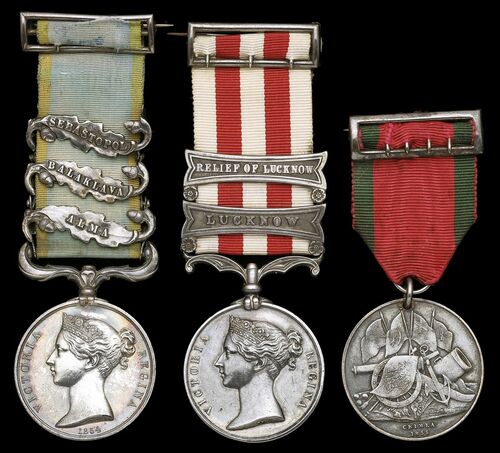
Auction: 23003 - Orders, Decorations and Medals
Lot: 165
Three: Surgeon W. Sinclair, 93rd (Sutherland Highlanders) Regiment of Foot
Crimea 1854-56, 3 clasps, Alma, Balaklava, Sebastopol, unnamed; Indian Mutiny 1857-59, 2 clasps, Lucknow, Relief of Lucknow (Asst Surgn W. Sinclair, M.D. 93rd Highlanders); Turkish Crimea 1855, British issue, each medal fitted with brooch pin and all housed in a fitted case, good very fine (3)
William Sinclair was born on 17 September 1831 at St. Lucia, West Indies. He became an Assistant Surgeon on 2 September 1853 and on 18 October became an Assistant Surgeon with the 93rd Highlanders.
Sinclair served at Malta prior to the Crimean War and joined the Great Britain which had left Liverpool for the Crimea in September 1854, stopping at Valetta to pick up additional Officers for the conflict, arriving on 13 October 1854.. He served with the 93rd Highlanders until 21 March 1855 and was present at the battles of Alma and Balaklava, and siege of Sebastopol, earning the medal with three clasps, leaving on a Medical Certificate. He received his Medal from the hand of Queen Victoria on 18 May 1855.
Sinclair then served in the Indian Mutiny, leaving from Portsmouth on Belleisle in June 1857, being in the action of Bunnee, relief of Lucknow by Lord Clyde, defeat of the Gwalior Contingent at Cawnpore and pursuit of Seraighat, affair of Kaless Nuddee, seige and capture of Lucknow; campaign in Rohilcund, including the attack on Fort Rooyeah, affair at Allygunge, and battle of Bareilly, actions at Pusgaon, and Russoulpore, evacuation of Fort Mithowlie, and action at Biswah (Medal & 2 clasps).
The Regimental History gives more detail:
'While the struggle was going on at the Secundrabagh a brilliant feat was performed by Captain W. G. Drummond Stewart, who was with the companies (Nos. 2 and 3) which had moved away to keep down the flank fire of the enemy while the breaching was going on. A party of men of the 93rd, with a few of the 53rd, were led by him against two of the enemy's guns which were raking the road; these they captured in the most gallant style, and immediately afterwards a lodgment was effected in the barracks, an immense building in the shape of a cross with a tower in the centre, which stood in a sort of large square with out-houses round the greater part. This secured our position on the left, and to connect this important post with the Secundrabagh, the 53rd and a company of the 93rd were extended in skirmishing order between them. All this was effected by three o'clock.
The regimental hospital had been established by Dr. Munro early in the day beneath the walls of the secundrabagh, and throughout the struggle, and in the midst of the hottest fire, he, as well as the assistant-surgeons, Sinclair, menzies, and Bell, were to be seen exposing themselves fearlessly in attendance on the wounded.
All the medical officers were present throughout the attack (Lucknow). Assistant-Surgeons Sinclair and Bell with the right wing, and Menzies with the left, accompanied the stormers, while Dr. Munro remained outside to receive the wounded, who were all collected afterwards, and taken to the regimental camp, which had been moved to the rear of the Dilkoosha during the day.'
Sinclair was promoted to Staff Surgeon on 29 July 1862 and served at Colchester between 1863-64. On 16 August 1864, he exchanged with Surgeon Henry Bowles Franklyn 1st/10th (North Lincolnshire) Regiment of Foot. Noted as Staff Surgeon on 7 December 1867 and being at Shorncliffe in 1868, he transferring to the 2nd/12th (East Suffolk Regiment of Foot on 12 December 1868. Sinclair died on 2 May 1871 at Southampton.
Subject to 20% VAT on Buyer’s Premium. For more information please view Terms and Conditions for Buyers.
Sold for
£1,300
Starting price
£600




